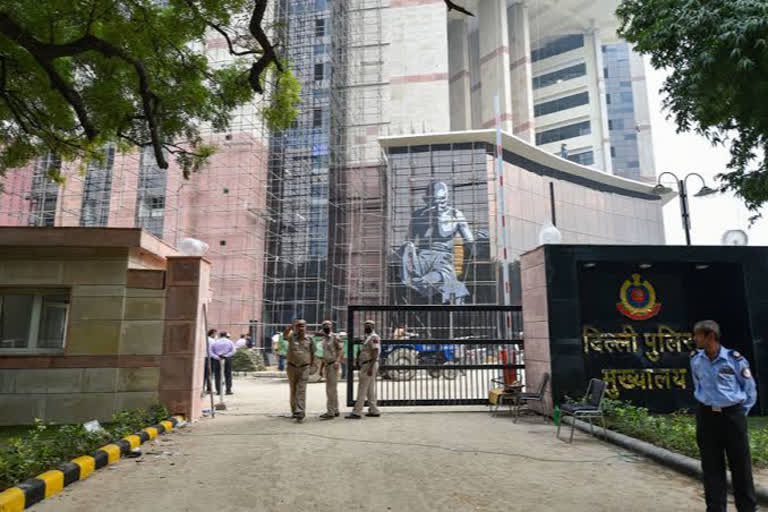New Delhi: The Special Cell of Delhi police on Sunday arrested two men in connection with alleged "anti-national" and "Khalistan-related graffiti" that appeared on walls in areas of west Delhi on January 19 ahead of Republic Day, officials said. The walls were painted with slogans like "Khalistan Zindabad", "SFJ", "1984", "Punjab Banega Khalistan", "Vote for Khalistan" and "Referendum 2020" at various locations in Vikaspuri, Janakpuri, Paschim Vihar, Peeragarhi, Meera Bagh and adjoining parts in west Delhi, they said.
The accused --Vikram Singh (29), a resident of Tilak Nagar, and Balram Singh (34), hailing from Bharatpur in Rajasthan -- were tasked to paint "pro-Khalistani" slogans in the western part of Delhi in lieu of Rs 2 lakhs and further lucrative offers in future, a senior police officer said. However, they were paid only Rs 2,000 after the act, he added. Both the accused worked as drivers in a prominent hotel in Aerocity, Delhi, the officer said.
Addressing a press conference, HGS Dhaliwal, Special Commissioner of Police (Special Cell), said the arrested accused clandestinely painted these pro-Khalistani graffiti" during the intervening night of January 18 and 19 and recorded videos of the same and sent them to senior cadres of the Sikh for Justice (SFJ) based abroad. "Proscribed terrorist Gurpatwant Singh Pannun then telecast the videos on YouTube claiming responsibility for the graffiti and threatening an attack on Republic Day in Delhi. Multiple cases were registered in various police stations of Delhi in this regard," he said.
Preliminary interrogation revealed that Vikram Singh was in close association with one of the senior cadres of the SFJ named Gagandeep, based in the US, whom he knew from a previous association. Gagandeep contacted Vikram Singh and claimed to be a close aide of Pannun, chief of the SFJ. He tasked him to write pro-Khalistani slogans in lieu of Rs 2 lakhs and further lucrative offers in the future, Dhaliwal added. Narrating the sequence of events, the senior officer said. Vikram Singh then contacted and convinced his colleague Balram to take a few days off and participate with him in the nefarious plan in lieu of quick money.
Vikram bought multi-colour sprays from a shop in west Delhi. The accused clandestinely wrote this pro-Khalistan graffiti during the early hours of January 19 and recorded the videos of the same. These videos were then sent to the Sikhs For Justice senior cadre based abroad for further broadcast through social media. Further nodes of this network are being identified. The investigation is in progress, he said. A case under sections 154B (imputations, assertions prejudicial to national integration) and 120B (criminal conspiracy) of the Indian Penal Code was registered by the Special Cell in this regard, police said.
According to the police, considering the gravity of the situation in view of Republic Day, a multi-pronged operation was launched and several teams of Special Cell were deployed in major suspected areas in and around the National Capital Territory of Delhi. A man-hunt was launched to arrest the perpetrators responsible for the graffiti, they said.
Round-the-clock surveillance was mounted on persons of interest. Hundreds of hours of CCTV footage were analysed. After the development of all the inputs generated through different means and efforts of multiple teams stationed in the areas of Vikaspuri, Janakpuri, Paschim Vihar, Peeragarhi, Meera Bagh, and adjoining parts of western, the suspects were zeroed in on Sunday. A team was deployed and both the accused persons were arrested in a swift operation," Dhaliwal said.
A motorcycle, six spray-paint bottles of multiple colours, along with a bag, two mobile phones, shoes, and clothes, including a jacket worn by one of the accused on the day of the incident and a bedsheet used to cover the number plate of the vehicle, have been recovered, police said.
Since the Sikhs for Justice (SFJ) is a banned organisation, it is trying to make itself known and wants to be in the news, the Delhi police had said earlier over the graffiti. Fringe organisation SFJ, run by a few radical Sikhs of foreign nationality in the US, Canada and the UK, was declared unlawful by the Union government under the provisions of Section 3(1) of the Unlawful Activities (Prevention) Act, 1967.
The Centre, by its July 10, 2019 notification, had declared the SFJ an unlawful association and had banned it for five years, saying the group's primary objective was to establish an "independent and sovereign country" in Punjab and it openly espouses the cause of Khalistan and in that process, challenges the sovereignty and territorial integrity of India.



